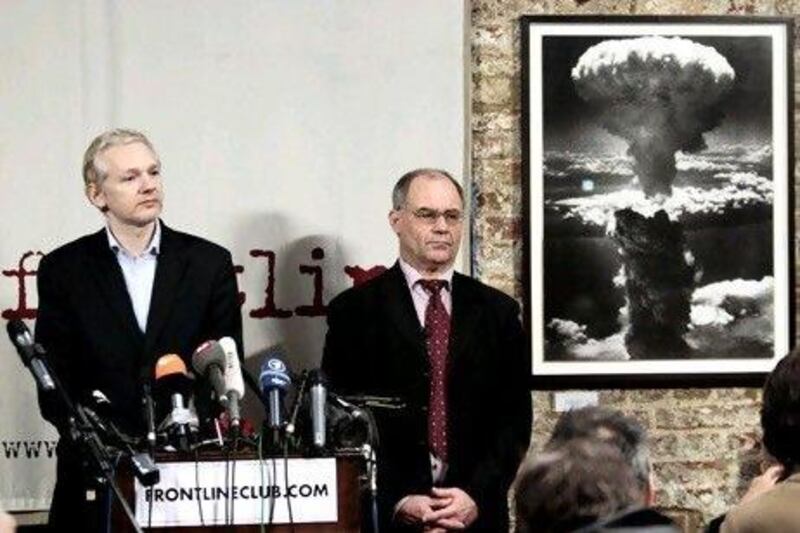The rich and powerful are trembling in their handmade shoes. Julian Assange is back, and this time the WikiLeaks founder has the financial world in his sights.
Mr Assange is either the hero of free speech or a dangerous ally of global terrorism, depending on which end of the political spectrum you occupy. He has outraged right-wing opinion across the world, but especially in the US, with his apparently unending series of revelations drawn from US diplomatic cables.
Now, having done with the diplomats, he is about to rock the world of finance with what promises to be an explosive expose of tax evasion, money laundering and plain old-fashioned fraud - focusing on Switzerland.
At a press conference in London a couple of days ago, Mr Assange emerged from his house arrest to be photographed with Rudolf Elmer, a former Swiss banker, who handed over two CDs to the Australian-born leaker. These discs were not compilations of Mr Elmer's summer holiday movies, that's for sure.
Mr Elmer is another serial leaker. He used to be the chief executive of the Cayman Islands branch of Swiss Bank Julius Baer, a position that gave him access to lots of juicy information about top people's banking records. When he was fired from his job in 2002, he began to publicise information that had come his way in the course of his work.
Mr Elmer claims he is acting in an attempt to expose wrongdoing and corruption at the highest levels of business and politics; Julius Baer counter-claims that its former chief is "disgruntled and frustrated about unfulfilled career aspirations" and that he is motivated by a desire to get his own back on the bank.
Both motives could be simultaneously true, of course. Mr Elmer could have suddenly seen the error of his ways over a number of years at the bank, and decided to "shop" the people he regards as guilty parties. His "disgruntlement" might amount to a simple desire to put things right, as he sees it.
In journalism over the years, I have come to appreciate the person known as the "DFE" - the disaffected former employee. DFEs, or whistleblowers, as they are also known, are great sources of information and, in some countries such as Britain, they are protected by legislation.
Not so in Switzerland, it seems. Mr Elmer is facing trial in that privacy-obsessed country charged with breaking bank secrecy laws.
Other countries might value the DFE more highly, regarding him or her as a valuable bulwark against wrongdoing. But the individual still takes a big risk. Nobody likes a "grass" (a pejorative London term for an informant, or "snitch" in the US vernacular) and the one doing the leaking will very often find themself isolated, ostracised and unemployable in that person's chosen profession.
The leaker may have lots of friends in the media, but that does not pay the bills.
Mr Elmer has obviously decided it's all worth it. At the briefing at London's Frontline Club (a media organisation dedicated to the promotion of investigative reporting), he said the data handed over to Mr Assange concerned multinational corporations, financial firms and individuals from Europe and the US over a 10-year period up to 2009.
How he got the data for the latter part of that period, after he left Julius Baer, has not been explained and will probably only come out in any subsequent court case. But it seems obvious that the bank has more than one whistleblower to worry about.
Mr Elmer said the data included details of the offshore accounts of about 40 politicians held in three banks, including Julius Baer. It is evident there are powerful forces at work trying to shut Mr Elmer up. But once the information gets on WikiLeaks, they may as well give up; it will be there for the world to see and judge.
The reaction of the Swiss is interesting; a representative of the country's banking industry said it was a "sophisticated, well-regulated financial centre with some of the strictest know-your-customer rules worldwide".
It's true the Swiss have opened up a little in recent years, mainly because of international pressure to do so. But I remember months of frustration in the 1990s when trying to publish articles about the location of wealth looted by the Nazis during the Second World War.
The culture of secrecy, especially in banking, is deeply ingrained in the Swiss. If they start to open up to everybody, why bother to go to the trouble of operating a Swiss bank account at all?
On the other hand, you have to recognise that there is a need for some kind of privacy in financial matters. I would not like my banking details revealed, not because of the embarrassment of riches it would reveal, but for the cringe-worthy series of overdrafts, loans, final demands and unpaid bills the world would see.
But that's not what we're talking about in Mr Elmer's case. As this information will soon be in the Wiki public domain, we will be able to judge for ourselves whether he is acting for noble motives, or just out for revenge. To have the opportunity to make that judgement is a good thing.





